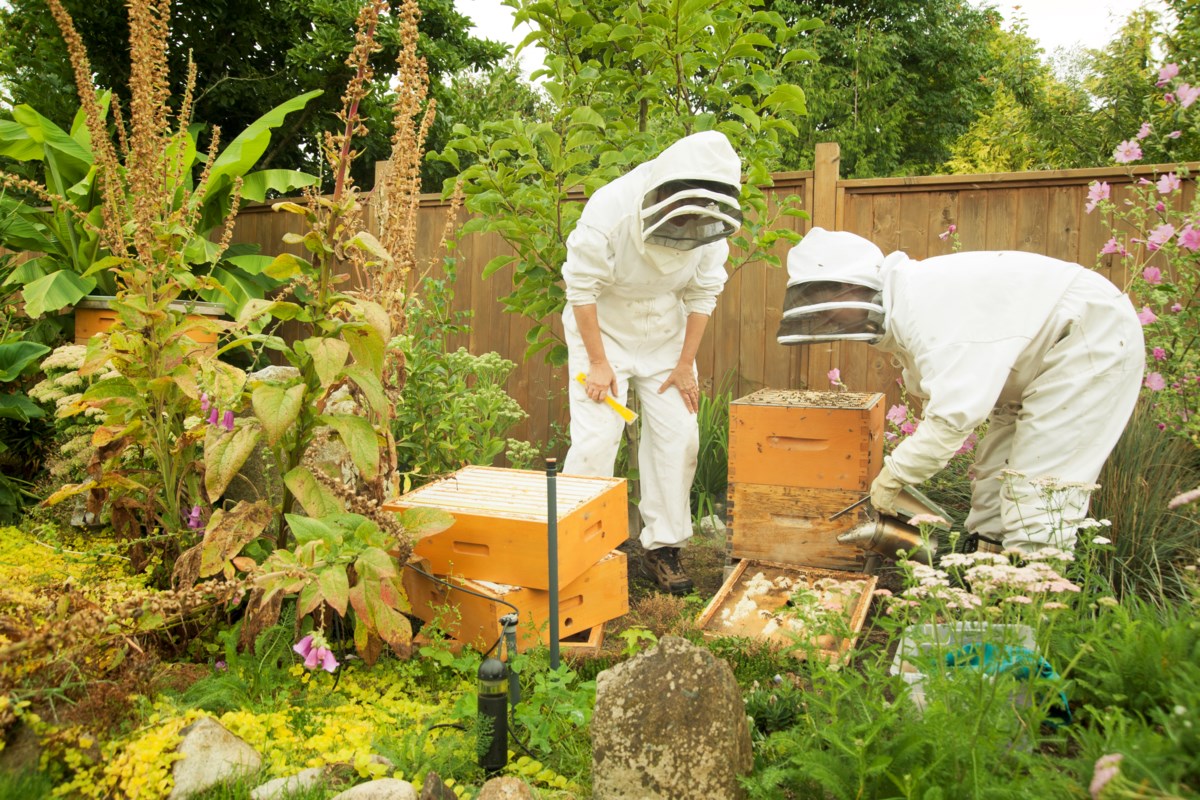READY TO EDUCATE AND SHARE – Shawn and Beth Dougherty have farmed together since the 1980s, for the past 20 years in the Toronto area where they manage 27 acres designated by the state as ‘unsuitable for farming’. Using intensive grazing as their primary source of food energy, they raise dairy and beef cows, sheep, farm-fed pigs, and a variety of poultry, producing most food and feed on the farm. They write and speak about agriculture, dairy farming, animal feed, and off-grid captured water systems. They are the authors of “The Independent Farmstead” and are part of the organizers of “The Healing Land Conference: Building the Independent Farmstead for Health and Freedom”, which will be held locally on April 1 and 2 and will offer tours, workshops and demonstrations related to homesteading. — Contributed
STEUBENVILLE – Spring brings a cycle of events not unfamiliar to area residents, with the return to daylight saving time, the start of Lent and a busy calendar filled with school and community activities.
But what is a new local event will take place April 1-2 with the first Healing Land conference welcoming experienced and aspiring farmers interested in learning more about building an independent farm for health and freedom.
The conference – which originates from the Four Seasons Community Center at 129 School St., Steubenville, in the former Pleasant Hill Elementary School off Route 213 – is “inspired by the organizers’ vibrant eastern Ohio farming community” and will include a day of workshops, tours, lectures, demonstrations and “animated brotherhood”, according to Beth Dougherty.
Along with her husband, Shawn, and son Lucas, Dougherty is three of the six members of the event’s organizing committee. The others are Dr. Brian and Johanna Burke and Terrence McKeegan.
“The two-day event begins with hands-on tours and workshops at many of the successful farms and small family farms that have sprung up in our region,” Dougherty explained in an initial press release.
“Visitors will see fully grassed, chemical-free herds of sheep and cattle, rotating dairy goats and wild-grazing pigs. Farmers will explain their methods of intensively grazing native forages, allowing animals to choose from local medicinal plants to optimize their natural health,” she noted. “Organic, no-till gardening will be on display, where hardy vegetables of heirloom varieties showcase the best of our Appalachian food traditions,” she added.
The second day includes lectures and panel discussions on topics as varied as raising meat rabbits to no-till gardening, holistic grazing, beekeeping, natural fertility and one-cow dairying.
Speakers include Shawn and Beth Dougherty, national speakers and co-authors of “The Independent Farm”; local experts such as Clint Finney of Spring Valley Stock Farms and Dr. Brian Burke; and talk show host and farmer Marcus Grodi. Experienced local farmers, smallholders, beekeepers and organic gardeners will complement the presenters.
“Side by side with the April 2 talks and roundtables, there will be live demonstrations of many homesteading skills,” Dougherty explained. “While young farmers assemble a mobile chicken coop or ‘tractor’, local craftsmen will demonstrate their skills in blacksmithing, knife making and pottery. Butter and cheese-making demonstrations will share the space with outdoor cooking and chicken butchering events. Attendees can try their hand at setting up a temporary electric fence and watch a passive-powered ram pump move water upwards,” Dougherty’s release continues.
Other varied demonstrations will be added to a day of “an extraordinary opportunity for everyone” Dougherty says of what organizers describe as a “Leading event in alternative agriculture and family ownership.”
“This local event offers a unique chance for people who care about family ownership to get a lot of experiences in one weekend,” the output promises. Local craft and food vendors will be on hand throughout the conference. For more information and to purchase tickets, visit www.thehealingland.com.
Contacted for more details, Dougherty offered insight into their involvement with the conference which is expected to become an annual event.
The Doughertys are longtime residents of Jefferson County. “We moved here in 1990, and in 1996 we bought a really unwanted, abandoned property outside of Toronto. We have lived here ever since, reclaiming the land and growing just about all of our food and feed here,” she explained.
“Over the past few years, more and more people have moved to the area, watched what we were doing, and started their own farms. We helped some of them get started, and a year ago, along with Dr. Brian Burke and his wife, Johanna, we started bringing these people together for social and work-sharing events. Some members of this community then came up with the idea of sharing our knowledge with a wider group of people,” she says.
Who exactly is this conference for?
“We target families and singles, of any age but usually younger, who already own a home and want help to make it work, ecologically, financially and relationally, or who are considering to become owners in the future”, Dougherty replied “We have much to offer them, for the principles we are about to describe are those which have operated small farms until the last century – grazing the grass by cows which are then milked to feed the whole farm; cattle mixed (cow/pig/chicken); and vegetable crops grown for humans and animals,” she noted.
For about 10 years, the Doughertys have spoken across the country about the type of farming they do.
“It’s different than most because we’re grass- and dairy-based, which means our grass-fed cows are milked, and the milk helps feed not only humans and calves, but also the other farm animals – even the ground “ she says. “That means we don’t need to buy animal feed, but feed our animals the produce we grow on the farm, and the fertility of our soil comes from the farm,” she added.
“The Burkes and Terrence McKeegan decided that our homesteading community could really benefit people new to the field by showcasing some of our farms and demonstrating how well our methods work,” she explained how the idea for the conference came about. “Terry has organized other great events, so he has the know-how to pull it off,” Dougherty added.
The homesteading movement has a long history in the United States, not to mention growing interest, according to Dougherty.
“There has been a farm subculture since the 1970s, but over the past five years, and especially since 2020, the interest in food safety, food security, food value and food independence has really grown to a great extent, Dougherty noted. “Conferences that brought together 1,000 people four years ago are getting 5,000 this year,” she added.
Add to this mix a degree of self-sufficiency and satisfaction.
“In addition to all the food reasons above, people look to the farm as a way to use their labor more directly to meet their needs, a way to work with their hands and with the earth, plants and animals”, she reasoned. “People are drawn to alternative agriculture because it’s so different from an industrial or administrative nine-to-five. I would also say that people want a life that is more in tune with the cycle of the seasons,” said Dougherty.
When asked what she means by small farms and what is the layman’s explanation of a “blooming house” Dougherty replied, “One of the biggest problems when talking about agriculture today is semantics – people use different words for the same thing, and the same words for different things.
“We use the classic meaning of the word ‘farm’, one that applied until the mid-1900s – a place where people use the land, ecology and climate to raise a wide assortment of animals and plants intended for food in such a situation. way to nourish all living beings, while ensuring that the earth is not degraded for future generations. It is a land where people live and grow their food, generation after generation,” she noted.
Small farms are plots of land that a family manages for housing and food, indefinitely.
“‘Prosperous farm’ would have a similar or identical meaning”, she says, pointing out that with several active farmers’ markets in town, it’s no surprise that Steubenville — and all of Jefferson and surrounding counties, for that matter — is home to thriving small farms.
In terms of area, an accurate definition of a small farm may vary, but “Here in west-central Appalachia, as little as 2 acres of cleared land could support a dairy cow. Because a dairy cow converts everything that grows into high-quality proteins, fats, and sugars, and many of them, she is (and has been for centuries) the foundation of a food safety system based on Earth “, Dougherty explained. “Grazing can be managed in such a way that the land is actually improved by the animals on it, so that the land gains in fertility and resilience (power to sustain itself in the event of adverse natural events such as drought, floods and extreme weather conditions) at the same time as it feeds the humans who manage it, and all the usual animals that people generally want to keep on a farm, such as pigs, poultry, dogs and cats.
Conference attendees can choose which events they want to participate in or attend.
“Yes you can pick and choose” Dougherty assured.
“There are morning and afternoon farm tours on Fridays, a social event on Fridays, the lecture on Saturdays and a social event on Saturdays,” she says. “Each is a stand-alone event, valuable on its own, but even more valuable in the context of the whole event.”
“We think there are people who are really, really hungry for this information, especially young families who are basically looking for instructions and examples of if I take my family and go live on 3 acres in the country, what shall I do then,” said Dougherty.
 Xoven Agricultor
Xoven Agricultor



